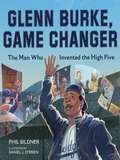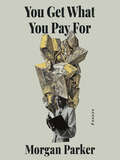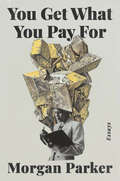Service Alert
Postal delivery
CELA has restarted production and distribution of embossed braille, printbraille and reloading of Envoy Connect devices. There may be delays in receiving your materials due to rotating strikes by Canada Post workers.
CELA has restarted production and distribution of embossed braille, printbraille and reloading of Envoy Connect devices. There may be delays in receiving your materials due to rotating strikes by Canada Post workers.
Showing 1 - 3 of 3 items

By Phil Bildner. 2024
Glenn Burke, Game Changer features sound design and special effects to enhance your listening enjoyment. Listen out for the sounds…
of Major League Baseball and cheers from the crowds. An inspiring audiobook biography about Glenn Burke, the first Major League Baseball player to come out as gay, and the story of how he created the world's most recognizable handshake, the high five. Playing for the Los Angeles Dodgers, Glenn Burke could do it all—hit, throw, run, field. He was the heart of the clubhouse who energized his teammates with his enthusiasm and love for the game. It was that energy that led Glenn to invent the high five one October day back in 1977—a spontaneous gesture after a home run that has since evolved into our universal celebratory greeting. But despite creating this joyful symbol, Glenn Burke, a gay Black man, wasn't always given support and shown acceptance in return. From acclaimed author Phil Bildner, this moving audiobook biography recognizes the challenges Burke faced while celebrating how his bravery and his now-famous handshake helped pave the way for others to live openly and free
By Morgan Parker. 2024
In her “witty and searing” first essay collection, award-winning poet Morgan Parker examines “the cultural legacy of Black womanhood and…
the meaning of finding ‘well-being’ in a world that wasn’t built for you” ( Vogue ). Dubbed a voice of her generation, poet and writer Morgan Parker has spent much of her adulthood in therapy, trying to square the resonance of her writing with the alienation she feels in nearly every aspect of life, from her lifelong singleness to a battle with depression. She traces this loneliness to an inability to feel truly safe with others and a historic hyperawareness stemming from the effects of slavery. In a collection of essays as intimate as being in the room with Parker and her therapist, Parker examines America’s cultural history and relationship to Black Americans through the ages. She touches on such topics as the ubiquity of beauty standards that exclude Black women, the implications of Bill Cosby’s fall from grace in a culture predicated on acceptance through respectability, and the pitfalls of visibility as seen through the mischaracterizations of Serena Williams as alternately iconic and too ambitious. With piercing wit and incisive observations, You Get What You Pay For is ultimately a portal into a deeper examination of racial consciousness and its effects on mental well-being in America today. Weaving unflinching criticism with intimate anecdotes, this devastating memoir-in-essays paints a portrait of one Black woman’s psyche—and of the writer’s search to both tell the truth and deconstruct it
By Morgan Parker. 2024
The award-winning author of Magical Negro traces the difficulty and beauty of existing as a Black woman through American history,…
from the foundational trauma of the slave trade all the way up to Serena Williams and the aftermath of Hurricane Katrina&“An engrossing journey through Parker&’s expansive and gifted mind.&”—Clint Smith, author of How the Word Is PassedDubbed a voice of her generation, poet and writer Morgan Parker has spent much of her adulthood in therapy, trying to square the resonance of her writing with the alienation she feels in nearly every aspect of life, from her lifelong singleness to a battle with depression. She traces this loneliness to an inability to feel truly safe with others and a historic hyperawareness stemming from the effects of slavery.In a collection of essays as intimate as being in the room with Parker and her therapist, Parker examines America&’s cultural history and relationship to Black Americans through the ages. She touches on such topics as the ubiquity of beauty standards that exclude Black women, the implications of Bill Cosby&’s fall from grace in a culture predicated on acceptance through respectability, and the pitfalls of visibility as seen through the mischaracterizations of Serena Williams as alternately iconic and too ambitious.With piercing wit and incisive observations, You Get What You Pay For is ultimately a portal into a deeper examination of racial consciousness and its effects on mental well-being in America today. Weaving unflinching criticism with intimate anecdotes, this devastating memoir-in-essays paints a portrait of one Black woman&’s psyche—and of the writer&’s search to both tell the truth and deconstruct it.